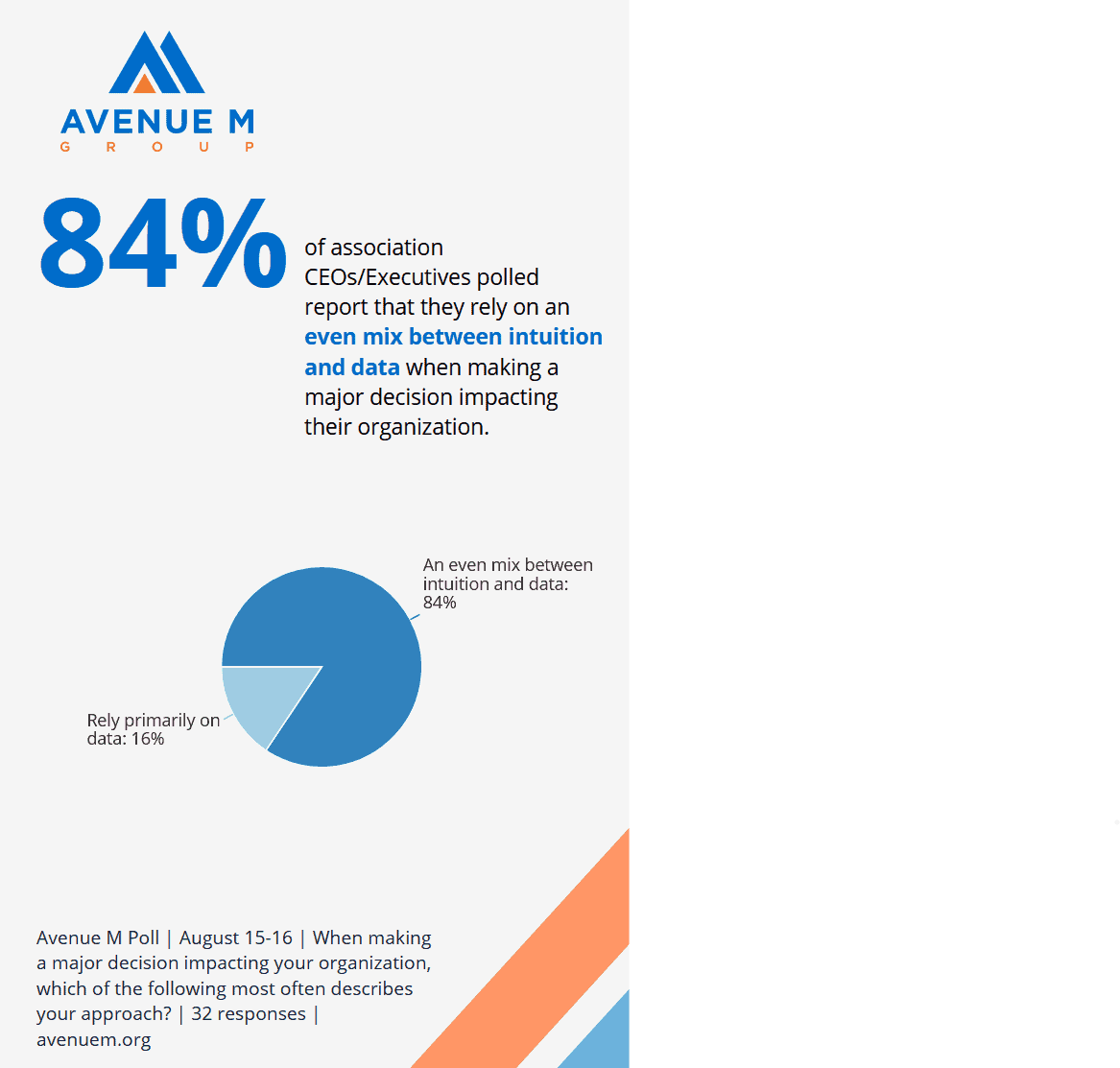Amid an overwhelming amount of data, association executives seek to integrate intuition with data rather than relying solely on one or the other. The human element—and empathy—still play a large role in their decision-making process.
Information overload is real, begging the question: How much information is too much? “People are drowning in data,” said the coauthor of a 2023 Oracle study—The Decision Dilemma. People are stressed and unsure about using data for decisions, which is negatively impacting their personal lives and business success.
The study found that 85 percent of leaders have felt stressed about decisions, mostly because they’re overwhelmed by data, and 72 percent don’t fully trust it. As a result, 94 percent have changed how they make decisions and 97 percent want more help from data. It’s become so overwhelming that 70 percent of leaders would rather have robots make decisions.

Curbing the data onslaught is vital for organizations to distinguish valuable insights from the noise and make informed decisions. Balance is key. Most association CEOs and executives (84 percent) said they use an even mix of intuition and data when making a major decision impacting their organization, according to a mid-August Avenue M Group text poll, while only 16 percent said they rely primarily on data.
When asked why they prefer this approach, one CEO panelist, who relies on an even mix of intuition and data, said, “Data helps to determine the technical aspects of decision-making. Intuition, empathy, and context help to determine a better holistic decision.”
For example, while data can provide a technical understanding of costs and help calculate cancellation fees for last-minute changes, it’s less likely to predict how the customer will feel when assessed a cancellation fee. That’s when “choosing empathy to make adjustments may be the correct path,” the panelist said.
Another CEO, who uses an even mix, said, “It combines experience—which is how my intuition was developed—and solid information and data.” However, they said when their board encounters data, “they want to follow their hearts.” That’s when a conversation about what has happened in the past often leads to a decision that is best for the association.
And one CEO, who relies primarily on data said, “It removes bias. Data-driven decision-making can always be explained or defended.”
Overall, while data can help with the technical side, relying on intuition and empathy gives associations a broader view, allowing them to make decisions that blend logic with human understanding, leading to better results. As one panelist noted, “Data can tell a lot, but it doesn’t always tell the whole story.”
Want to partipate in future text polls? You can sign up HERE.
For more insights on managing data overload, read Avenue M’s quick summaries of the following resources and click the links below.
Reducing Information Overload in Your Organization
Despite efforts to upgrade communication tools, information overload is a common issue. In a survey by Gartner, 38 percent of employees said they receive an “excessive” number of communications, and 27 percent feel overloaded with information. This hurts alignment with company strategy, engagement, and decision-making.
High burden, reported by 40 percent of leaders and 30 percent of managers, leads to regretful decisions and resistance to change. Tackling this requires creating a culture of lighter communication, focusing on essential information, and working together to reduce burdens on employees.
A Better Process for Better Decisions
Leaders often make decisions using intuition, but this can lead to biases and flawed outcomes. To counter this, the Mediating Assessments Protocol (MAP) suggests breaking decisions into smaller parts for better analysis and to avoid biases.
The Association of American Medical Colleges uses a similar process to assess ideas efficiently, emphasizing data-driven choices without adding complexity. The aim is to delay, not eliminate, intuition, promoting a balanced decision-making approach that combines instinct and analysis.
8 Pitfalls in The Data-Driven Decision-Making (DDDM) Process
Organizations have heavily embraced data-driven decision-making (DDDM), using data to inform choices rather than relying solely on intuition. This approach promises improved decision quality and confidence across various levels of decision-making within the organization, from executives to customer interactions, leading to better outcomes. Here are some key points.
- Trustworthy Data. Good DDDM relies on reliable and relevant data; doubts or misalignment can hamper the process.
- Smart Analysis. Accurate analysis is key; proper training and support are needed for effective self-service analytics.
- Solid Recommendations. The right suggestions matter: teamwork between data and business teams prevents mistakes and helps DDDM work.
Want to be the first to be notified about articles like this? You can learn more about Avenue M’s texting poll service HERE.
Contributors: Sheri Jacobs, FASAE, CAE & Lisa Boylan
Image: Adobe Stock